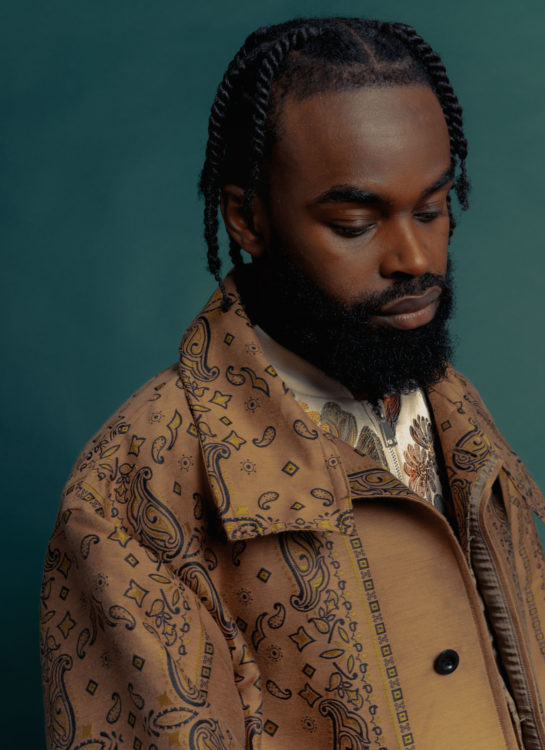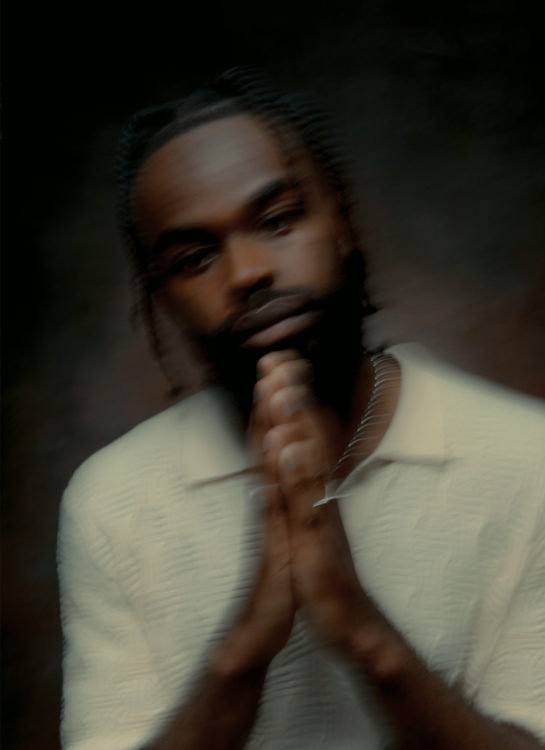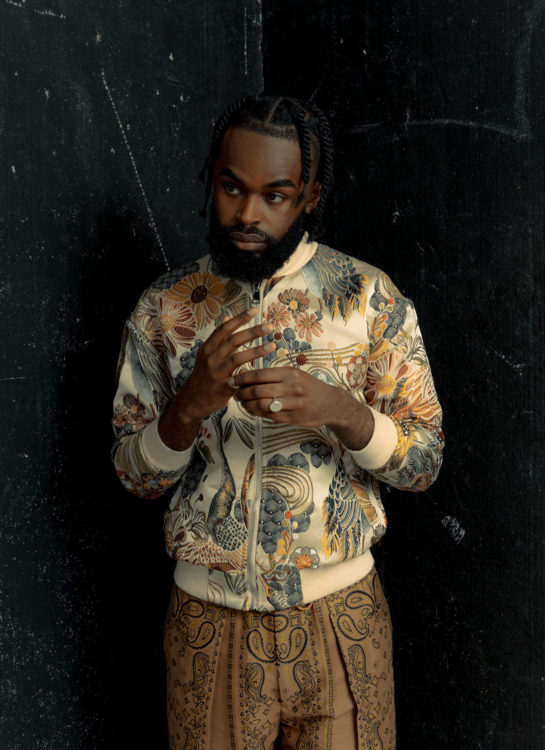- Words Isabelle Cassidy
- Photography & Direction Rashidi Noah
- Gaffer Brad Walsh
- Fashion Amii McIntosh
- Grooming Sam Lascelle
- Production & Location Studio Notion
A guitar virtuoso making music that resists classification, we sit down with Mansur Brown to discuss his creative approaches, wide-spanning influences and why he’ll be forever evolving.
The late-great Prince is an artist to whom contemporary comparisons cannot be drawn lightly. Known for instrumental mastery – particularly virtuoso guitar playing – a commitment to complete artistic control, and a genre-crossing roster of influences, the American artist is widely regarded as one of the greatest musicians of his generation.
Speaking to Mansur Brown, although their music may not bare a huge amount of sonic resemblance, the young musician’s reverence for the icon makes complete sense. Composing, producing, and playing every part on his latest album ‘NAQI’, Mansur’s breathtaking mastery of guitar sits amongst all-encompassing instrumental confidence that’s earned collaborations with the likes of Yussef Dayes and sessions with Little Simz, Alfa-Mist and Kamaal Williams. Mansur’s influences are also equally broad, as during our interview an unlikely line-up is built, including the likes of Flying Lotus, Machinedrum and Travis Scott, alongside cinematic composer Hans Zimmer and metal band Deftones.
Prince’s several notable confrontations with record companies in the name of artistic freedom and fair profit distribution are also part of his legacy, sharing with Mansur a deep-rooted resistance to external forces controlling creative innovation. Demonstrated by the creation of his label Amai Records in 2021, Mansur was motivated by a desire for control over his own resources, to “have a platform where I can really express myself fully”, he explains.
If you’ve ever watched an interview with Prince, and seen a performance, there is even a commonality between Mansur’s gentle and introspectively articulate speaking voice repeatedly telling me about “finding peace”, versus the explosive musicality of the artist’s live shows.

- Coat & Trousers TOGA ARCHIVES
- Jacket GOLDSMITH VINTAGE from THIS WAY NEXT

- Ring (right hand) TOM WOOD
- Ring (left hand) FEATHER PENDANTS
Chatting to me from a train platform, I’m nervous the distractions may impair the depth of our conversation, but Mansur could not be more engaged – despite occasional tannoy announcement interruptions. He’s Brixton-born and still South London based, already with two albums and a stream of EPs under his belt. Mansur’s latest project was released in two parts, Volumes 1 and 2, the second of which is out now. “It was initially going to be a full-length EP or album”, he explains, “I wanted to play it as an EP, but I thought a mixtape would be a better fit simply because it’s filled up with different things. It’s better to make music that’s more cohesive, isn’t it?”.
Telling me about ‘NAQI’, the final part of which dropped today, he continues, “Both of the volumes display the juxtapositions between enjoying yourself and being happy, and that there are always two parts to that. You always have the upbeat part, where you’re ready to have fun with friends, but there’s also happiness which is more introverted or introspective.”
He’s certainly been on a journey of intention, as well as tracking musical shifts since previous album releases, ‘Shiroi’ in 2018 and ‘Heiwa’ in 2021. Asking how the new project marks a musical evolution, Mansur cites varying influences as contributory, “In 2018, I was very much into Flying Lotus, Machinedrum, that kind of stuff. I took a more technical and more ‘musical’ approach. As I moved into 2021, I was listening to a lot of artists like Travis Scott, especially ‘Astroworld’, and the sonics of that in a way had quite a big influence on me. I really liked the trippy, ambient stuff”.
Where his previous discography has commemorated “being on a long journey of peace and finding peace of mind”, his new project offers “a sense of resolution”, “when you’re at a place where you’ve found peace and you’re happy”. In Volume 1, he also tells me he “wanted to convey more of a dance element; an element of enjoying yourself and being in a crowd with people”.

- Necklace STEPHEN WEBSTER
- Ring SHAUN LEANE from EMMA BECKETT PR
In discussions of Mansur, the artist’s classical guitar training is often a point of interest, perhaps concerning his departure from a ‘classical’ sound in a traditional sense. Although he acknowledges the “cerebral and elite” nature of the ‘classically trained’ label, his virtuoso playing hasn’t imparted an elitist view of how others make music, “it’s all just expression really, ultimately, however you do it”. Guitar melodies might be what first strikes a listener, but Mansur also stresses, “when I’m making music, everything is a bit more equal”. The instrument may be the focal point, but his open-minded creative outlook feeds into this area too: “I think from a compositional point of view when I make everything, it’s all equal. And from the view of performing, I guess the guitar is the centre point, but I also like to think that I’m in the early stages of this. There’s a lot of things I want to explore, I’m forever changing, forever evolving”.
The idea of spanning genres, moving between styles, or somehow straddling contrasting musical areas is one readily used in the description of artists perhaps hoping to reach new audiences in this resistance of singular classification. In the case of Mansur, he describes his music as “genre-less” and you’d be hard-pressed to disagree. He brings up more musical influences, “My love and my relatability are towards rock bands that I grew up listening to such as Hendrix, Prince, Eddie Van Halen. All those people who were icons on their instruments”. I get a sense that his rooting in high-level musicianship has aided an appreciation for how artists handle their instruments, rather than what genre they fit within. He agrees when I suggest this, “Musicians and icons, those were the people I really looked up to, alongside being into everything else”. He continues, “It’s hard to convey that to people because people like to put things in boxes. But I think innovation is important. Do what you want to, how you want to.”


With a headline sold-out show at EartH Hackney on the 22nd of November, and one on the 2nd in Sheffield, fans can expect Mansur’s live performances to be very different to the recorded versions of his tracks. Using a hip-hop formula based around looping, his live performances leave space for enrapturing and rolling renditions that dance around familiar melodies. He tells me about what he calls “tone tasting” and “sound chasing” when getting ready for a show, “where you’re getting different pieces of equipment to try and find the right sound. It’s the equilibrium between technicality and emotion, I think they both go hand in hand when it comes to sound and music”. His perfectionist nature extends to this process, taking a freeform approach when working with his live band, but “it’s got to be so particular”. Show attendees are in for a treat, Mansur excitedly expressing “I’ve got some new sounds I’ve been experimenting with so I’m super excited and happy to get to show that to an audience”.
Wrapping up our interview by asking what’s next, he tells me he’s “fallen in love with scoring” and recently composed a score for a video game. We go down another rabbit hole of influences, Mansur listing composing greats alongside their films: Hans Zimmer (Superman, Interstellar, Inception), Ryuichi Sakamoto (The Revenant) and Ludwig Göransson (Black Panther, Tenet). When it comes to admiring other musicians, I feel Mansur really could passionately talk forever. Returning to my original question, alongside focussing on his upcoming gigs, the artist wants to “incorporate a nu-metal vibe with a bit of grunge”, but “at the same time I’m really into rap”- and wants to start including more vocals. He jokes about being all over the place, but considering his ever-present perfectionism and an inherent need for innovation, it’s a combination that’ll take Mansur Brown far.







